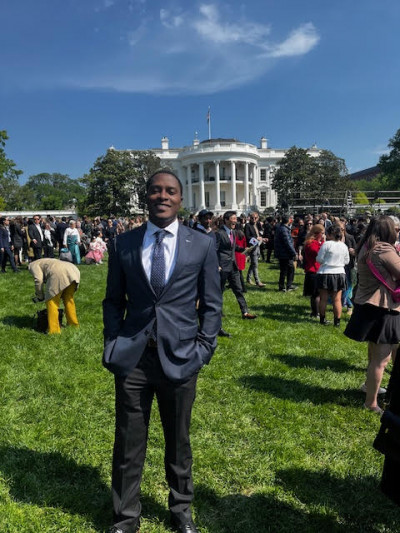The Council on Environmental Quality (CEQ) may not be as well known as some other subdivisions of the executive branch of the U.S. government that focus on the environment — the Environmental Protection Agency, say, or the National Ocean and Atmospheric Administration. Still, the CEQ wields substantial oversight, says De’Marcus Robinson, who, as a John A. Knauss Marine Policy Fellow, spent 2023 working with the agency.
“When it comes to ocean policy, CEQ plays a pivotal role,” Robinson explains. The CEQ was formed in 1969 to oversee the implementation of the National Environmental Policy Act, which requires federal agencies to conduct environmental studies before making major decisions. It’s one of the most important pieces of environmental legislation in U.S. history, though one that, like the CEQ itself, is less known to the public than bigger names like the Endangered Species Act. Among other roles, CEQ co-chairs the Ocean Policy Committee (OPC), which includes representatives from over twenty agencies and coordinates federal action on ocean-related matters.
“So you can think of the CEQ as a kind of ‘boss’ when it comes to oceans and coasts,” Robinson says.

Sponsored by the National Oceanic and Atmospheric Administration (NOAA) and the National Sea Grant College Program, the Knauss fellowship places graduate students in federal government offices in Washington, D.C., where they learn about the national policy decisions affecting ocean, coastal and Great Lakes resources. Robinson heard about the fellowship as an undergraduate at Florida Agricultural and Mechanical University. His work focused on applied research, rather than policy — he was researching organic materials that might help clean up oil spills — and at conferences met scientists who worked for NOAA and other federal agencies. So when a former Knauss fellow mentioned the impact of the program, he was intrigued.
In 2018, Robinson headed to the University of California, Los Angeles, to begin his doctoral studies in oceanography. Once more, he was focused on research, and in particular “oxygen minimum zones,” or layers of water with particularly low oxygen continent. He was interested in science communication, and founded a nonprofit, Behind the STEAHM, that aims to demystify misinformation and miscommunication. The group has hosted webinars, including about seafood misinformation in the popular Netflix documentary Seaspiracy. But at UCLA he found few opportunities to delve into policy in a formal setting — a problem compounded by the coronavirus pandemic, which foreclosed many extracurricular opportunities. As soon as the pandemic ended, Robinson applied for the Knauss fellowship. He was accepted and placed as an Ocean Policy Fellow with the CEQ.
The council has a wide purview, Robinson notes, and the sole constant to his days in Washington was waking up to take the Red Line to the White House. (The CEQ office is, fitting for the agency’s under-the-radar ethos, a nondescript brownstone that sits catty-corner from the presidential abode.) There, he found himself thrown into the work of the CEQ’s water team: attending meetings; preparing memos for the water team and CEQ Chair Brenda Malloy; and organizing stakeholder sessions to consider varied communities’ relationships with the ocean.
Robinson arrived at the CEQ just as the council was finishing its work preparing what’s known as the Ocean Climate Action Plan, which examined not just the threat that climate change poses to the world’s oceans but, importantly, the way that the ocean might serve as a key solution, and his work often involved coordinating with other agencies to help them implement the plan. Given his interest in ocean biogeochemistry, he was particularly interested in policy related to marine carbon dioxide removal. Robinson helped develop the “Ocean Justice Strategy,” which aims to advance environmental justice for communities that rely on the ocean and Great Lakes for economic, cultural, spiritual, recreational and food security purposes.
Robinson’s long-term goal is to teach science at a historically black college or university. “But science is always a part of something bigger,” he notes. By viewing the ocean from a broader, most holistic perspective, he knew he’d be better able to prepare his future students for a full range of ocean-related careers. “A year in Washington definitely opens up your mind to the broader ocean conversation,” Robinson says. “Everybody should have a taste of that.”